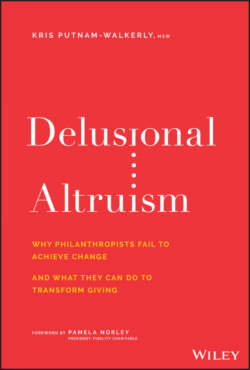Читать книгу Delusional Altruism - Kris Putnam-Walkerly - Страница 25
Fear of Being Out and About
ОглавлениеPhilanthropists also fear exposure. Not exposure that they have done something illicit or unethical—I mean fear of being seen. Fear of being out and about in their community. Fear that others will have access to them. As a result, they stay inside their bubble. They withhold themselves. In the process they suppress their own learning, and they make life harder for the those they want to help.
I understand why this is a real concern for celebrities. You might want to attend your favorite charity's gala, meet with parents to understand opportunities to improve local schools, or just go for a walk in Central Park. But you can't because you will be overwhelmed by fans and photographers. Or you could be someone with a fear of wide open spaces, crowds, or strangers. Attending the charity gala might truly be horrifying!
But chances are, you don't suffer from fears like these and you're not George Clooney.
Yet, like many philanthropists, you might maintain an arms-length relationship with your grantees and communities. Many donors hide behind family offices, wealth advisors, and publicists. They give anonymously through their donor-advised fund. They literally stay inside their offices and mansions. I once worked with a foundation executive who refused to visit nonprofits at their offices, insisting they come to him because it was more convenient (for him).
You might be on the board of directors, though, and guess what? Fear extends there as well. I am constantly amazed at the firewalls that some philanthropies put up around their board members—separating them from staff, from grantees, and even from community. I suppose there are board members who might appreciate that shelter, but if that's the case, I question whether they should serve in the role. Foundation board members should provide a key means of connection with community. Foundations should leverage not just the financial contributions of board members but also their relationships and influence. Board members can make key introductions, act as advocates, give presentations, and make themselves available to community members as representatives of the foundation. Yet too often, they are relegated to the boardroom.
As a funder, it's regrettably easy to stay in a “bubble” of isolation and fear—constrained either mentally by your own assumptions and knowledge, or physically by never leaving the office and venturing out into the community. If you're in a bubble, you probably aren't intentionally undermining your own effectiveness—but you are deluding yourself that you're achieving the impact you'd like to see. For effective grantmaking to really happen, you need to break out of the bubble and make an effort to deeply understand and connect with the communities you serve.
